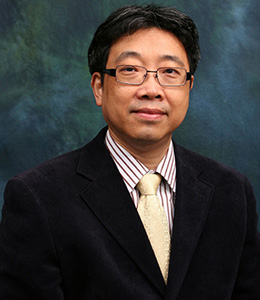
Prof. Jiannong Cao
Hong Kong Polytechnic University
Dr. Cao is currently a Chair Professor of Department of Computing at The Hong Kong Polytechnic University, Hong Kong. He is also the director of the Internet and Mobile Computing Lab in the department and the director of University’s Research Facility in Big Data Analytics. He served the department head from 2011 to 2017. Dr. Cao’s research interests include parallel and distributed computing, big data analytics, wireless sensing and networking, and mobile and edge computing. He has published extensively on these topics, with co-authored books and papers in major international journals and conference proceedings. He received Best Paper Awards from EEE Trans. On Industrial Informatics, DSAA’2017, IEEE SMARTCOMP 2016, IEEE/IFIP EUC 2016, IEEE ISPA 2013, IEEE WCNC 2011, etc.
Dr. Cao is a fellow of IEEE and ACM distinguished member. In 2017, he received the Overseas Outstanding Contribution Award from China Computer Federation. Dr. Cao served the Chair of the Technical Committee on Distributed Computing of IEEE Computer Society 2012-2014, a member of IEEE Fellows Evaluation Committee, IEEE Computer Society Education Awards Selection Committee, IEEE Communications Society Awards Committee, and Steering Committee of IEEE Transactions on Mobile Computing. Dr. Cao has served as chairs of organizing and technical committees of many international conferences including IEEE INFOCOM, IEEE PERCOM and IEEE COMPSAC. He also served as associate editor of many international journals including IEEE TC, IEEE TPDS, IEEE TBD, IEEE TCC, IEEE IoT Journal, ACM TOSN, ACM TCPS, and ACM TIST.
Learning analytics based on multilayer behavior fusion
Learning analytics is the measurement, collection, and analysis of data about learners and their contexts for the purposes of understanding and optimizing the process of learning and the underlying environment. Due to the complex nature of the learning process, existing work mostly focuses on the modeling and analysis of single learning behavior and bears limited capacity in achieving good performance and interpretability of prediction tasks. In this talk, I will share our work on learning analytics based on multilayer behavior fusion, which can achieve significantly better performance in various tasks including at-risk student prediction. Results of extensive evaluation on thousands of students from two universities demonstrates the effectiveness of multilayer behavior fusion. I will report the insights about mining learning behaviors at different layers including physical, social and mental layers from the data collected from multiple sources. I will also describe the quantitative relationships between these behaviors and the students’ learning performance.

Prof. Jiyou Jia
Peking University
Prof. Jiyou Jia is a full professor and the Head of the Department of Educational Technology, Graduate School of Education, Peking University, China and is also the founding director of International Research Center for Education and Information at Peking University. From August 2017 to December 2018, Prof. Jia served as Distinguished Professor at Institute for Research in Open and Innovative Education, the Open University of Hong Kong. He was invited to work as a guest professor in 2015 by School of Education, Technical University of Munich, Germany.
Prof. Jia received B.S. and Master of Education from Peking University, and Ph.D. in artificial intelligence from Augsburg University, Germany. His research interests include educational technology and artificial intelligence in education, especially in TELL (Technology Enhanced Language Learning), math education with ICT, and decision making support system. He has been responsible for a dozen of national projects and international cooperation projects. His research has won a number of national and international prizes including the First Class Award of the Fifth National Award for Outstanding Achievements in Educational Research, from Ministry of Education, China, 2016, and IAAI (Innovative Application of Artificial Intelligence) Deployed Application Award by AAAI (Association of Advancement of Artificial Intelligence), USA, 2008.
Prof. Jia has published more than 100 articles in internationally or nationally peer-reviewed journals and conferences including Computers and Education, Knowledge-Based Systems, etc. He has edited one book and authored another one, both written in English and published by IGI Global, USA. He is also the author of one Chinese book and one book in German. He serves as a reviewer for several international journals indexed in SCI/SSCI, a co-chair or PC member of more than 20 international conferences including ICCE, ICALT and GCCCE, and an advisory expert for some scientific and governmental organizations.
A Multimodal human-computer interaction system and its application in smart learning environments
A multimodal human-computer interaction system is composed of the comprehensive usage of various input and output channels. For the information input, the traditional keyboard typing, mouse clicking, screen touching, as well as the latest speech and face recognition can be used. For the output, the traditional screen display, the latest speech and facial expression synthesis and gesture generation can be used. This speech will at first present such a system developed by the speaker’s team, CSIEC (Computer Simulating Interactive Educational Communication). Then the speech will introduce its pilot applications in two intelligent tutoring systems, one for mathematical instruction and another for English learning as a foreign language.

Mr. Karlcharn Kongkatong
Solution One
Mr. Kongkatong is currently the CEO of one of Thailand’s largest mobile commerce (or m-Commerce) firms and a successful consultant in the telecommunication businesses. He started Solution One Holding in 2002 as the country’s first mobile-application company. Solution One became the first Thai company to aggregate musical works from international music label later in 2002 and joined Apple music and iTunes as a direct music partner in 2012. Solution One Holding partnered with Youtube as a direct partner in 2012 and later moved to become its Multi-Channel Network or MCN in 2016. Mr. Kongkatong pioneered in the entertainment industry in Thailand by becoming the first service provider which has distributed Korean and Myanmar musical work since 2005.
Before Solution One Holding, Mr. Kongkatong established S-One Telecom in 2000 to work with Nokia (Thailand) which resulted in the development of Club Nokia and CRM Platform for Nokia (Thailand). S-One Telecom wrote EZ Thai Application, the first Thai Based Application for Symbian, bundled and sold with over 2.5 million phones from 2002-2007. The company has operated as the first private SMS Gateway linked with all local operators from 2002-present (now as part of Solution One Holding).
For educational background, Mr. Kongkatong went to the US to start his Middle Year program. After the completion at Westtown School in Pennsylvania, he continued his undergraduate education at University of Washington (Seattle, Washington) in Economics during 1986-1990. He completed his MBA program in Finance from Pepperdine University in California in1991. Then, he returned to Thailand and had worked with Samart Corporation from 1992 until the start of S-One Telecom in 2000.
The Skill of Future Workforce in the Era of Business Disruptions
To become a successful company or to maintain its success, there requires the specific set of skills of the workforce. It is important to recognize that these skills are becoming increasingly more dynamics today, especially when facing with the transformation into the digital and shared society today. Higher cognitive skills which involve creativity and innovation have to be part of skill development and training at higher education institutes. In addition, social and emotional skills are needed when dealing with workplace synergy and customers. Digital skills are absolutely the necessity for any firm regardless of the size due to digitalization of business operations.
My story includes business circumstances and trends during the last decade in which Solution One Holding has to overcome digital and business disruptions, regulatory challenges, and dramatic changes in consumer behavior. The discussion will conclude with the key skill areas that business operators will likely need in the next decade. Although many business operators have clearly identified these future skills, it appears that the contents for skill development are not totally effective. It is hopeful that the CEO’s insights will lead to better content development which can be successfully disseminated through the combination of e- and blended Learning as a lack of sufficient skillful workforce has contributed to business interruptions and discontinuation.

Dr. Hugh O'Connell
ICDL Thailand
Dr. Hugh O’Connell is managing director of ICDL Thailand - The International Computer Driving License, the world's leading computer skills certification. He has been resident in Thailand for almost 25 years and has a background in education and training. Hugh is working closely with the Thai Government to promote digital literacy in Thailand and align digital skills with the Thailand 4.0 initiative. As a result, in late 2016, ICDL programmes were the first digital literacy qualifications to be mapped to the Thai Qualifications framework, and are now being implemented throughout both the public and private sector. Prior to working with ICDL, Hugh has run his own business and taught at a number of universities at both the undergraduate and postgraduate level. He is a vice president of the Irish Thai Chamber of Commerce and actively works to promote mutually beneficial links between Ireland and Thailand.
Digital Transformation and Digital Literacy - Blended Learning in Action
The talk will consider the driving forces for digital transformation that are creating change at an ever increasing pace. This creates a gap between the skills that workers have and the skills that they need. There requires an imperative for business and education to fill the gap. It is clear that a divide is found between the digital skills that people have and the skills that they think they have, called the “perception gap.” In other words, people think they are better at basic IT skills than they really are. In order to close this gap, educationalists must consider how to provide base level digital skills to the population as a whole. Traditional educational approaches do not have the capacity to achieve this, so the solution to this dilemma is often touted to be e-learning. This however leads to a paradox – can computers be used to learning computing? This talk proposes that blended learning is the necessary choice to ensure maximum inclusion and effective skills development.

Dr. Punpiti Piamsa-nga
Kasetsart University
Dr. Punpiti Piamsa-nga is currently an associate professor and Head of Department of Computer Engineering, Kasetsart University (KU), Thailand. He is also a deputy director for research information of KU Research and Development Institute. He earned his B.Eng. and M.Eng. in Electrical Engineering from KU in 1985 and 1989, respectively, and his D.Sc. in Computer Engineering from the George Washington University in 1999. He has been a member of various committees for developing computer science curriculums for both K12 and higher education. He has been Team Leader of Thailand for participating in International Olympiad in Informatics for 10 years. His current main research interest is on feature extraction and pattern analysis in various applications, such as smart farming, bioinformatics, and image/video content analysis.
Design a curriculum with user-experience analysis: case study computing science curriculum
To improve the education, a new design of curriculum is always a part of the pro-cess. However, its development usually relies on the change of body of knowledge and class implementation. As a result, it might not succeed since it is compromised with issues in the deployment. In this paper, we propose to introduce a design concept on user experience (UX), which is extensively studied in the software engineering and computer science research, as a design tool. When the curriculum is improved, not only the body of knowledge is changed, the changes also affect all related resources and activities. If some of them was not well prepared, it would become the obstructions. The UX design/analysis is a process that uses meaningful experiences of all users in all aspects, such as resources, management, usability, and implementation. All related action roles to the system in the past is needed to be analyzed. The new curriculum should be designed based on possibility of implementation and optimized based on the user experience in the future. We introduce the study of computing science curriculum design for basic education. The case study has discussions on the analysis, the objective layout on the curriculum development, and the design of the curriculum.